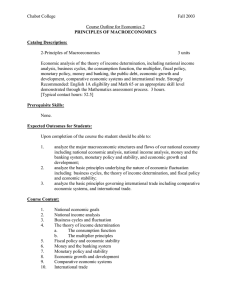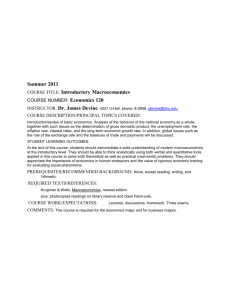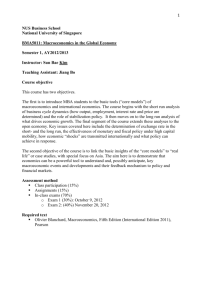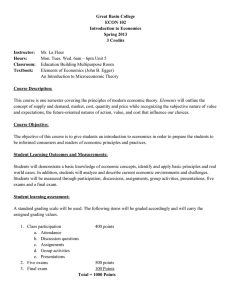C S OURSE
advertisement
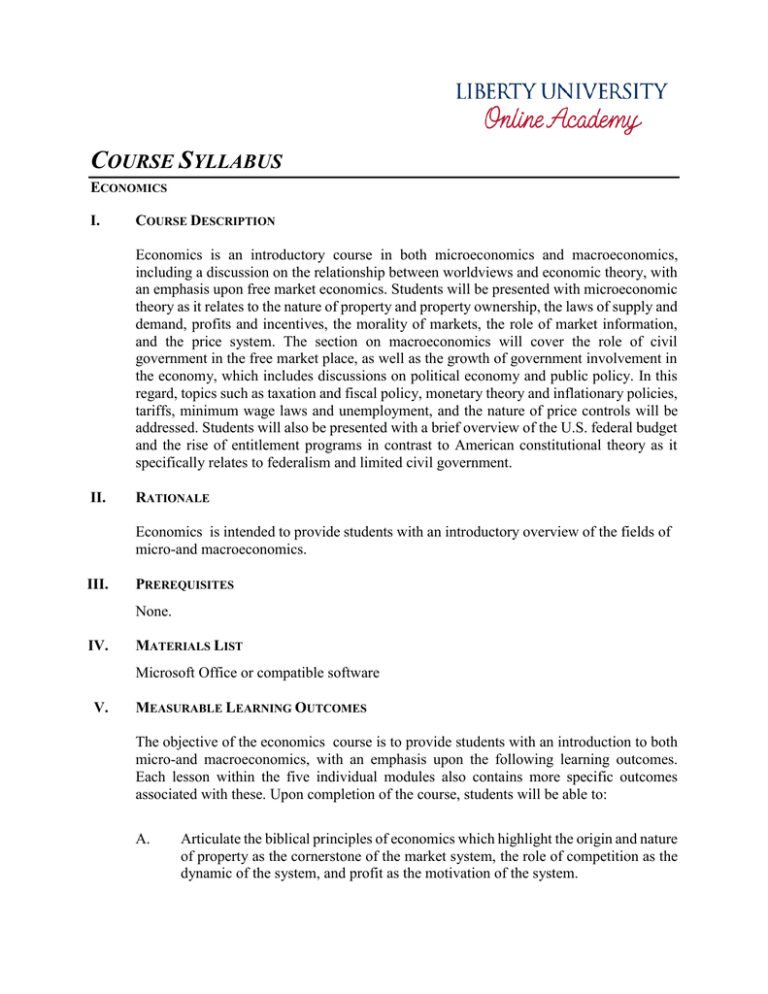
COURSE SYLLABUS ECONOMICS I. COURSE DESCRIPTION Economics is an introductory course in both microeconomics and macroeconomics, including a discussion on the relationship between worldviews and economic theory, with an emphasis upon free market economics. Students will be presented with microeconomic theory as it relates to the nature of property and property ownership, the laws of supply and demand, profits and incentives, the morality of markets, the role of market information, and the price system. The section on macroeconomics will cover the role of civil government in the free market place, as well as the growth of government involvement in the economy, which includes discussions on political economy and public policy. In this regard, topics such as taxation and fiscal policy, monetary theory and inflationary policies, tariffs, minimum wage laws and unemployment, and the nature of price controls will be addressed. Students will also be presented with a brief overview of the U.S. federal budget and the rise of entitlement programs in contrast to American constitutional theory as it specifically relates to federalism and limited civil government. II. RATIONALE Economics is intended to provide students with an introductory overview of the fields of micro-and macroeconomics. III. PREREQUISITES None. IV. MATERIALS LIST Microsoft Office or compatible software V. MEASURABLE LEARNING OUTCOMES The objective of the economics course is to provide students with an introduction to both micro-and macroeconomics, with an emphasis upon the following learning outcomes. Each lesson within the five individual modules also contains more specific outcomes associated with these. Upon completion of the course, students will be able to: A. Articulate the biblical principles of economics which highlight the origin and nature of property as the cornerstone of the market system, the role of competition as the dynamic of the system, and profit as the motivation of the system. B. C. D. E. F. G. H. I. J. K. L. M. N. O. P. VI. VII. Identify or explain the economic fallacies attributed to the free market relative to the morality of the system. Assess the role of prices as to their information function as the power of the market system. Discuss or identify the nature of voluntary exchange and subjective value theory. Distinguish between the laws of supply and demand with their associative function in the market. Discuss or identify the nature of money and monetary theory. Distinguish between domestic protectionism and foreign trade restrictions and their policy impact upon the market, and free international trade. Critically analyze the role of government in the market system and the impact of central planning. Identify or explain the origin, nature and consequences of the Federal Reserve System as the U.S. monetary authority and its impact upon the Great Depression. Assess the significance of the Franklin D. Roosevelt Administrations and the emergence of New Deal Legislation and America’s welfare state. Identify or explain the nature of equality, and distinguish between equality of opportunity and equality of outcomes, and the nature and impact of egalitarian economic policies. Identify or explain the nature of inflation as a monetary policy and its economic consequences. Identify or explain the nature of the American constitutional order and system relative to its federal dynamic and the proper interpretation of Article 1, Section 8, clause 1: the ‘General Welfare’ clause relative to U.S. economic policy. Identify and explain the origin of U.S. Budgets and the role of fiscal policy relative to taxes and their impact upon productivity. Discuss or identify the nature of price controls relative to price ceilings and price floors. Identify or discuss the rise of U.S. entitlement programs and their impact upon the federal budget as well as productivity. COURSE REQUIREMENTS AND ASSIGNMENTS A. Individual lesson assessments: 1 lesson assessment per session in the form of a fivequestion quiz worth 25 points. Some lesson assessments are essays. B. Section Quizzes: 11 section quizzes covering material consisting of 4 to 5 five lessons. Each quiz is worth 75pts. C. Writing Assessments per Unit Module: 2 writing assignments per unit worth 25pts. or 35pts. D. 1 Test per Unit Module worth 150pts. E. 1 Final Exam worth 250pts. COURSE GRADING AND POLICIES A. Grading Weights Lesson Assignments 25% Page 2 of 3 Quizzes and Written Assignments Tests Final Exam B. Scale A B C D F VIII. 35% 40% 40% 93 – 100 85 – 92 77 – 84 70 – 76 Below 70 Other Policies A. B. Academic Misconduct See pages 32-35 of your Student Handbook Repeating Assignments Students may repeat lesson assessments for a maximum of two attempts. Additional attempt requests will be decided on a case by case basis. Page 3 of 3

